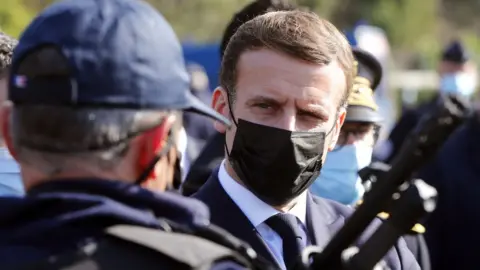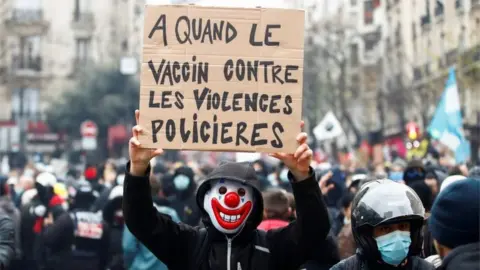France's Macron calls for 'urgent' police reform following protests
French President Emmanuel Macron has said there is an "urgent need" to reform the security forces, following weeks of protests over police violence.
He will hold a summit next month to review community relations and the working conditions of the police.
"I want to move quickly and concretely," Mr Macron said in a letter to a leading police union on Monday.
It follows weeks of nationwide demonstrations over a controversial draft security law.
The bill, as initially introduced last month, prohibited taking and sharing photos of police "with malevolent intent", but opponents said this would make it difficult to document police brutality.
Demonstrations over the draft law intensified after footage emerged of white policemen beating a black music producer last month.
Four officers involved face charges of "intentional violence by a person holding authority".
In response to the backlash, President Macron's governing party said the draft article on filming police would be rewritten. Mr Macron also acknowledged "some officers" were violent and that they "must be punished", in an interview with the youth-focused news website Brut - prompting angry criticism from police bodies.
What did the president say?
"It is urgent to act to beef up the trust between the French and the police," Mr Macron wrote in a letter to the Unity-SGP-FO police union.
"[We must] give police and gendarmes the means to meet their commitments and the expectations of our citizens," he added. "I will intervene personally."
 Reuters
ReutersHe said next month's summit would bring together senior police officers, citizens and politicians at the headquarters of the interior ministry.
They are set to review issues such as police staffing, discrimination training and the use of video cameras during operations. "We owe [the police] support and protection," Mr Macron wrote. "I will see to it."
The meeting, he said, would be based on proposals announced by Interior Minister Gérald Darmanin last week.
Mr Darmanin listed what he called the "seven deadly sins" of the police force that could be subject to reform. These included training, supervision, equipment and the police disciplinary body.
"One of the difficulties is that there aren't enough leaders... present on the streets," Mr Darmanin told the National Assembly. "We must rebuild an intermediate group of supervisors on the ground."

A difficult balancing act

President Macron has decided it's time to get personally involved in the worsening relationship between public and police.
There have long been complaints from the police about working conditions - broken toilets, broken patrol cars, hostility from the public, and long unsociable hours with little psychological support and low pay.
Alongside that have been growing complaints from the public about police violence and discrimination during protests, identity checks and police operations.
But this has never been enough to get the French president so personally involved.
It was a national march against the controversial draft law that showed both sides of the coin Mr Macron is dealing with. It showed the difficulties facing the police - dozens of officers were injured - but it also showed that many people felt the government was on the wrong side of the debate.
There's also pressure on the president to show right-wing voters he can be tough on security in time for the presidential election in 2022.
But the current sense of crisis has meant striking the right balance between protecting the police, and policing them.

 Reuters
ReutersThe president's letter was a response to the secretary general of the Unity-SGP-FO union, Yves Lefebvre, who expressed anger at Mr Macron's interview with Brut.
Mr Lefebvre accused the president of "blaming the police rather than blaming politicians... who discriminated... and banished immigrants to the suburbs, with a total lack of diversity, so they didn't have to see them".
Another major union, Alliance, described the president's comments as "shameful". "The president will get the police he deserves," it said in a statement.
